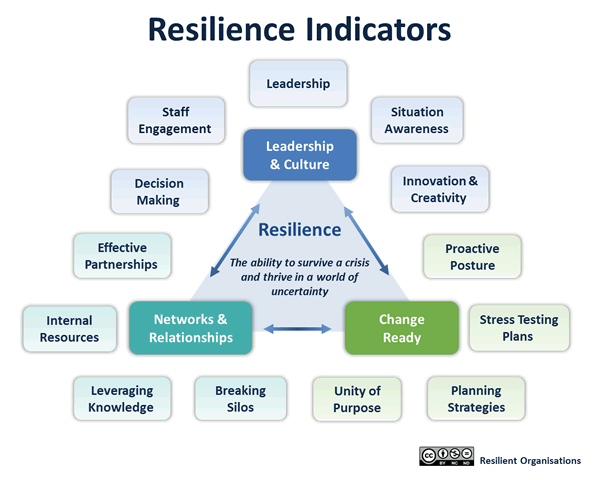-
Due: Tuesday, 4 April 2023, 11:49 AM
-
Change starts with you! Elissa Farrow from http://www.aboutyourtransition.com.au focuses on what we can personally influence in any change process even if we have limited control. Elissa coaches us in techniques and tips that will make a real difference in how we individually cope with change. Building resilience starts at the individual level and therefore we are individually responsible for our attitude to change and how we behave in the workforce. Check out the About Your Transition website for more on change, strategy, planning and delivery approaches and blog posts from Elissa Farrow.
-

Resilient Organization, Adaptable ... القدرة على التأقلم ... المؤسـسـة المنيعـة.
Organizational resilience is the ability to survive a crisis, and thrive in a world of uncertainty. resorgs.org.nz
A resilient organization: is an organization that is able to survive crises and thrive in an uncertain world. Enterprise resilience is a strategic ability; it is not just about weathering crises. A resilient organization has several advantages including insight and situational awareness to prevent potential crises arising, ability to turn crises into a source of strategic opportunities, continuous evaluation of strategies and action programs against organizational goals, as well as being adaptable, resilient and sustainable in the face of disruption.
Resilience: is a strategic capability that gives the org. its Degree of Adaptability
It isn't just about getting through crises. A truly resilient organization has two other important capabilities -
1- The foresight and situation awareness to anticipate and put measures to prevent potential crises, emerging, and
2- The ability to turn challenges and crises into a source of strategic opportunity.
3- The organizational capacity to recover and adapt quickly to environmental challenges and opportunities.
___________________________________________________________
Resilient organizations and their major characteristics
Adaptive Capacity Adaptability: Resilient organizations have a strong ability to adapt to changing circumstances. They are agile and flexible, able to quickly adjust strategies, processes, and structures in response to new challenges or opportunities.
Strong Leadership: Resilient organizations are typically led by leaders who demonstrate vision, clarity, and resilience themselves. These leaders inspire and guide their teams through uncertainty, fostering trust, collaboration, and a sense of purpose.
Learning Culture: Resilient organizations prioritize continuous learning and development at all levels. They encourage experimentation, embrace failures as opportunities for growth, and promote a culture of innovation and creativity.
Effective Communication: Communication is key in resilient organizations. They have open, transparent communication channels that facilitate sharing of information, ideas, and feedback across teams and departments.
Diverse and Inclusive: Resilient organizations value diversity and inclusion. They recognize the importance of diverse perspectives, backgrounds, and experiences in driving innovation, problem-solving, and decision-making.
Strategic Planning: Resilient organizations engage in strategic planning and risk management. They anticipate potential disruptions, develop contingency plans, and proactively address challenges to minimize their impact on operations.
Strong Relationships: Resilient organizations prioritize building and maintaining strong relationships with stakeholders, including employees, customers, suppliers, and the community. These relationships provide support, resources, and networks that contribute to resilience.
Emotional Intelligence: Resilient organizations foster emotional intelligence among their employees and leaders. They promote self-awareness, empathy, and effective communication skills, which are crucial in navigating complex situations and maintaining positive relationships.
Adaptive Structures and Processes: Resilient organizations have adaptive structures and processes that enable them to respond quickly to change. They leverage technology, data-driven insights, and best practices to streamline operations and enhance efficiency.
Commitment to Sustainability: Resilient organizations prioritize sustainability and responsible practices. They consider environmental, social, and governance factors in their decision-making, aiming for long-term viability and positive impact on society.
Measuring organizational degree of adaptability. Resilience Indicators:
The 3 interdependent attributes that build Business as Usual BAU effectiveness
1- Leadership and Culture.
2- Network and Relationships.
3- To be change ready.

